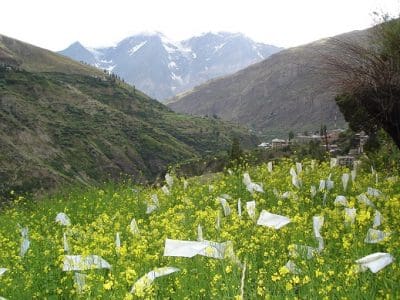A GLOBAL team including scientists from India’s Punjab Agricultural University and the University of Western Australia (UWA) have made a significant breakthrough in disease resistance in Brassica oilseed crops.

Oilseed crosses in the Himalayas that were part of the sclerotinia resistance trials.
Brassica is an important genus of plants in the mustard family with varieties that are commonly used for food including broccoli, cauliflower, cabbage, turnip and, in particular, as oilseed crops for production of canola oil and mustard.
The findings will lead to advances that strengthen crops against attack from Sclerotinia stem rot, a disease that is particularly damaging to Brassica crops, such as canola and mustard, causing major yield losses worldwide.
Published in the journal Frontiers in Plant Science, the research describes genetic markers associated with resistance against the Sclerotinia stem rot disease in Brassica juncea (Indian mustard).
Martin Barbetti from the UWA School of Agriculture and Environment and UWA Institute of Agriculture said managing Sclerotinia stem rot could be achieved through genetic resistance present within Brassica crops.
“Developing crops with greater disease resistance is the only effective avenue for long-term, cost-effective management of this devastating, worldwide pathogen,” Professor Barbetti said.
“Our research has opened the way for deployment of the introgressed resistance genes from wild weedy Brassicas into a wide range of high-yielding cultivars, of B. juncea initially and, subsequently, into canola and other crop and horticultural Brassica species,” he said.
The research has significant benefits for agriculture in Australia and India.
“Brassica juncea is the premier oilseed crop of India, and has great potential for drier regions in Australia,” Professor Barbetti said.
“This research will provide the opportunity to develop disease resistance in other Brassica crops, such as canola, the major oilseed crop in Australia.”
This study was supported by the Department of Biotechnology, the Government of India, the Indian Council of Agricultural Research and UWA.
Source: UWA

HAVE YOUR SAY